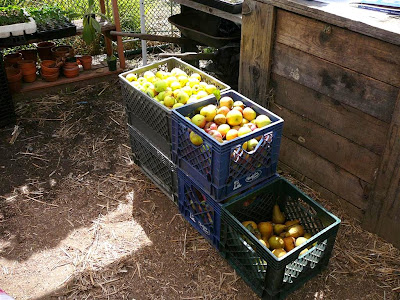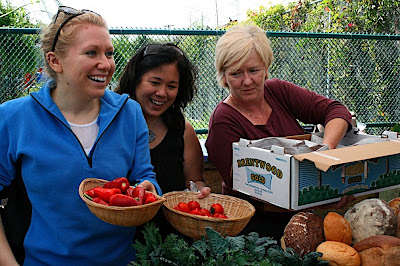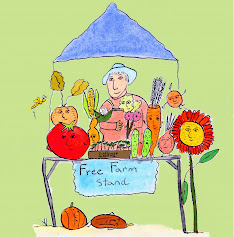We Bay Area folks are lucky to have so much choice in fruit to eat during the summer. The Free Farm Stand had a good selection of local fruit today. On Saturday night Angie and I visited friends in El Cerrito in the east bay. Having a one track mind and thinking a lot about food harvesting and collecting, I realized that a social visit can be turned into a fun fruit gleaning trip. I noticed right away that the family we were visiting had an orange tree loaded with fruit and the next door neighbor a tree loaded with apples. And the house on the other side had been foreclosed and was abandoned and up for auction. It had a dying lemon in the front yard and an apple in the back. Both had a lot of fruit on them that I picked, and I also got to pick some oranges from our friends. The other apple tree I had to get permission from the neighbor, but I didn't have time.


So besides the apples, oranges, and lemons, I scored a lot of delicious organic Brown Turkey figs from the Ferry Building Farmer's Market. Of course they were delicious and very popular and I learned the word higo for fig. We also had more plums from the Secret Garden and a woman came by with what looked like the last of her tasty dark red plums. I am still picking cape gooseberries that I wrote about previously and had some to give out today. People don't know what they are, but once they taste them they usually like them. This was the first week we had a lot of tomatoes, another fruit of the summer though we think of it as a vegetable. I picked them from all the gardens. And then Dave from down the street came by with three bags of the most delicious cherry tomatoes he just picked. I want to find out the variety name for his dark red ones that looked like Cherokee Purple.


Eli who I also wrote about last week, came by as promised with a large jar of plum sauce that he made from a half bucket of plums that he got from the stand last week that I picked from the secret garden. I am going to give it away next week probably if I get some small plastic yoghurt containers with lids to put it in. Brooke and Justin recently found an abandoned pear orchard in Moraga in the east bay and picked a lot of pears and have been drying them with a food dryer. I tasted one of the dried pears and it was yummy. I am really busy all this week, but would like to organize a trip there to pick the pears. Also, I would like to organize a community food processing day to can or dry some of our abundance.
Again I was surprised with the amount of other produce we had at the farm stand and that I was able to give almost all of it away. The secret garden produced a lot of lettuce, kale, and Asian greens. The runner beans are declining in productivity, I picked just a handful. A Treat Common gardener complained to me that she didn't like the way the runner beans tasted and that the fuzziness was unpleasant, but I disagreed with her. Am I a minority of people who like to eat runner beans? Christy came by with the end of her harvest of purple string beans, more rhubarb, and some summer squash from the Corona Heights Community Garden. I am continuing to grow sprouts and people like them.
Christiane came by with some honey from her bees in Golden Gate Park and it tasted very different from our honey. She put it in larger jars and once I get some more jars, I will bottle it up to share at the stand. She left some honeycomb in it for people to see it. I really appreciate people sharing something so special like honey that comes from hives taken care of with love and gentleness.

I was happy that Allegra and Christy came by and could speak Spanish with the large number of Hispanic people who come by the stand. I love all the families that get fresh organic and local produce, knowing that the kids are getting real healthy food. With diabetes and obesity of the rise, especially in minority communities, encouraging people to eat and grow some of their own organic food is a step in the right direction we all need to go in. I hope the free farm stand is getting this message out to the people who come. Here are some photos of some Mission kids, some of the cutest ones around.



Slow Food Madness
I made it down to the Slow Food events in the Civic Center on Saturday. The main event down there seemed to be the farmer's market with all the hippest probably most expensive, organic and sustainable produce and products around. I understand the labor that goes into growing this kind of beautiful loving food and probably putting your money into organic food (if you have it) is worth it to support the industry and the bees (more on that later). But the market by its nature and the whole Slow Food weekend hardly promoted slowing down and moving away from consumerism.
Personally, being a wannabe farmer, I got over excited and stimulated being down there with all the crowds and the excitement of all these groovy booths selling the most wonderful melons, or dry farmed early girl tomatoes, or Koda rice which I have never heard of but made me want to buy it all. Each booth had a printed sign describing the farm or product they were selling, and where they were located and why what they were doing was so great. I fell in love with the heirloom potatoes and was able to talk the saleswoman into giving me a red Peruvian spud to try growing at home (I didn't have say much she was very generous). To tell you the truth I didn't even look at any prices. The elephant heart plums were exciting too. I recently tasted an elephant heart plum at Martin's soup kitchen before I knew what variety they were, and they were absolutely delicious. The woman at the stand said they were alternate bearing, but worth growing them. I can't wait to get some scion wood for them and try growing them myself. I also dropped in the bookstore booth and checked out all the books out promoting local organic food, there are so many of them out now. Plus all the cookbooks with the same theme..."cook you own local organic sustainable slow foods".
I also made it over to the free 'Soapbox" events in the fabulous Victory Garden. Our local permaculture promoter Benjamin Fahrer was doing a great job as MC. When I showed up he was talking about pee-pee ponics and saving your nitrogen rich urine for your citrus trees (10 parts water to one part piss). I thought that was far out to talk about that with that crowd (the place was packed). He also made a great pitch to make the Victory Garden there permanent and told us to contact our local politicians to tell them that.
I spoke later in the day with John Bela who helped make the garden a reality and he told me that the garden was going to stay there until November. He says they already have harvest over five hundred pounds of food for the food bank! (By the way if anyone has an extra scale to loan or give us, I would love to weigh how much produce we are giving out at the Free Farm Stand each week, I think it is great to document these things).
John made one of the best arguments for moving the garden from its present location. He said that the space should be preserved for large gatherings that often happen in front of city hall, like big protests or rallies. I see his point, but am not sure if there isn't room both for garden and rallies. I saw a complaint on the SFist website (http://sfist.com/2008/06/25/farmers_market_survives_newsom_thre.php) about the closing down of the City Farmer's Market for the Pride Sunday event.
There has been a fair amount of complaints about the Victory Garden being only temporary and even a protest on August 20th by Food Not Bombs (http://sffnb.org/2008/08/13/event-protest-serving-at-city-hall/). .. "In this case the garden is temporary and at a cost of $180,000 (though sponsored by a private group), while the nearby Heart of the City Farmers Market, a critical and much needed source of healthy food in the tenderloin and south of market neighborhoods has fought for it's survival and against massive rent increases pushed by the mayor and real estate
department". SFBG Politics (http://www.sfbg.com/blogs/politics/2008/07/a_hollow_victory_for_urban_gar.html ) called it a "Hollow Victory". .. "Indeed, if Newsom and other city officials wanted to make a real commitment to support this effort, they would pursue a citywide program of supporting community gardens (which keep getting ripped up these days) and doing a survey of what surplus city properties could be turned into gardens that might still be there after the television crews have gone." I think having the garden downtown and across from city hall is a valuable educational tool that gets a large number of people thinking about all kinds of food issues and gardening in general. I think finding another sunny place downtown to grow a big garden would be a good goal of the city, Slow Food Nation and Victory Gardens 08. There is a lot of lawn around the new library though not as sunny as where it is. I also like community gardens, but I think we need more Victory Gardens that grow food for non-profit groups feeding the hungry. Like FNB writes, "Enough with theatrics, resolutions and press conferences, San Francisco needs concrete support for permanent, healthy and accessible food for residents of civic center/tenderloin neighborhood and other low-income communities." They might have missed the point that the current garden is doing that right now and it is a beautiful effort, it just needs to be made permanent.
The best talk I heard was by Serge Labesque who is a bee keeper and teacher from Sonoma County. He is the teacher that my bee teacher Bryan respects. He spoke about the "trouble time for our bees". He explained what the factors are for the pollinators declining in the U.S. He said the number of honey bee hives have declined to critically low levels for the past six decades. He said there were a number of things we can do. Among the things he recommended to help the bee is to buy locally grown organic produce, to provide habitat for pollinators around your homes, don't use chemical compounds in your gardens, become an organic backyard beekeeper, propagate local bee stock (don't buy bees especially queens that were raised away from our area), or join a local bee club.
Wild Boar Eaters
Last Thursday went to a local event don't the street called the Pirate Seed Swap. The poster I got by email said "The Greenhorns, a sneak peak at the documentary about America's young Farmers", "Heather Flores, author of Food Not Lawns with a slide show about saving seeds and swapping them", "with slow nibbles, biodynamic wines, seed to swap, handout, nation –wide slow food friends". The event was hosted by the Greenhorns, Slow-Food Nation, and the Bull Moose Hunting Society (it was in their warehouse). Here is a review of the event on the web: http://www.saveur.com/article_print.jsp?ID=1000064576. Here is my reporting.
I actually looked the documentary trailer up online and I discovered my friend Brooke was in it. It looked interesting, stories about young people that become hip farmers that grow safe and sustainable food. The filmmakers want to inspire a new generation of farmers that will preserve our farmland and our food supply. And make a living out of farming (good luck!).
I checked out the seed swap and it was mostly seeds from seed companies, some seeds that people saved and brought, but I didn't find anything I needed. I talked up the seeds I brought to share to a couple of people looking at the seeds, the Double Purple Orach that I grew this year. I also attended the talk by Heather and she was mainly promoting seed swapping events. I like the idea of people saving seed and sharing it and eventually having a seed library, another wonderful project a local garden team could organize.
The part of the event that really sent my mind reeling was the introduction by this man from the Slow Food Nation. He welcomed everyone and explained the nature of the event and that people were invited to join in the feast, that include recently hunted wild boar from Sonoma (inspired I suppose by Michael Pollan in Omnivore's Dilema). The article above said it was shot on a non-functioning ranch north of Sacramento. He introduced
a man who lived at the warehouse that was hosting the event who is a member of the Bull Moose Hunting Society. The society is about promoting hunting and tracking, and teaches young people how to hunt and shoot a gun and clean and gut the animal for meat. The wild boar are non-native pests (kind of like non-native trees but more destructive) according to them and so it is good to shoot them and eat them and to know where your food comes from and what they eat. It is sustainable they claim and a good thing that we should all learn. My friend Antonio was trying it out and he said it was weird tasting, but that he has been eating vegetarian for a while so maybe he wasn't used to it. The platters of boar disappeared pretty fast as people chowed down on it all.
I just want to put this matter to rest. As much as I understand this boar eating, I personally prefer to remain a vegan and stay with my principles of doing as little harm as possible in the world. About a year or so ago I was so mad at the rats eating the avocadoes in the trees in the garden I was working in, I thought about getting night vision goggles and a bb gun and shooting them. I think I could have done it at that time. Now I am thinking that the wild boar eaters don't have to travel out of town to go hunting. They should stay local and hunt the rats that are everywhere here (it is a delicacy in Thailand and it doesn't come with the karma of eating pork). Then they could go for the feral cats that are everywhere pooping in our gardens and eating the birds and over reproducing.



















































